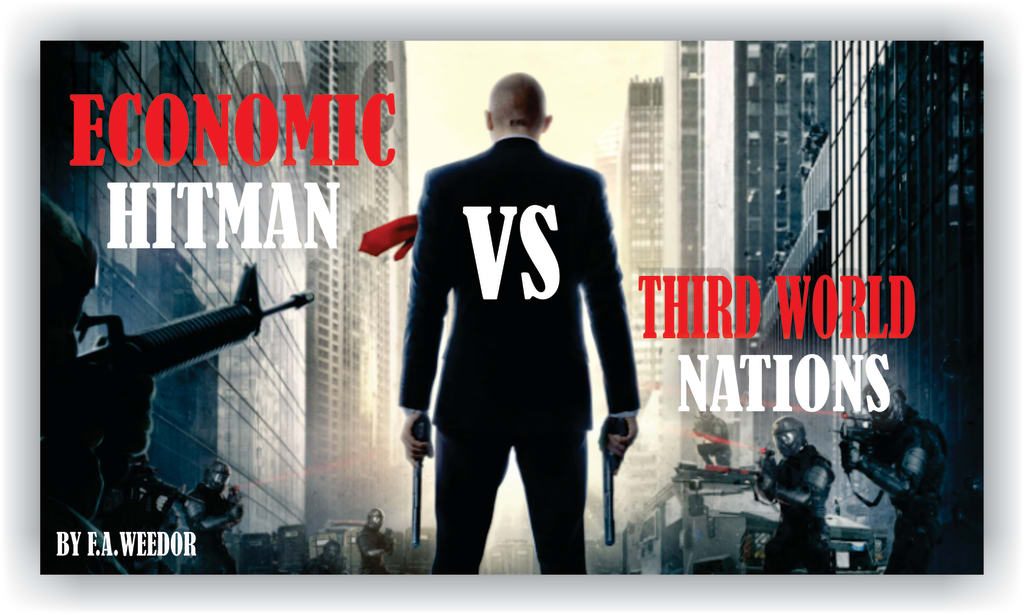Economic Hit Man: Who are they?
Which third-world nations are affected?

The economic hit men: who are they? Are they saddling financially sound nations with massive debt in order to exploit their riches and maintain power over them? The wealthy are becoming richer while the underprivileged are getting poorer. What matters, in my opinion, is that it did really occur and that a select number of wealthy individuals worldwide benefitted from it.
To pay off the country's debt, money has been taken from the health care and education sectors. A large number of individuals are benefiting from these crises. To continue the game, everything has been done.
Do strong organizations employ economic hitmen? That induces under developing nations to agree to invest in infrastructure they don't absolutely need and borrow money they can't really afford in order to earn a profit?
In my senior year at the Haywood Mission Institute, I always did a lot of personal research on trade, stocks, and bonds. Even after graduation, my interest in trading continued to grow as I read studies on various companies and observed market price movements.
Confessions of an Economic Hitman by John Perkins, which I came across while conducting research in 2022, shocked me because it revealed that some business people were discussing buying and selling entire countries' economies rather than simply buying and selling stocks or companies.
According to John Perkins, economic hit men who work with larger countries to exploit and eat up poorer nations. They employ experts whose job it is to fool nations and swindle them out of trillions of dollars. I then asked myself, "Was this a colonial strategy to rob nations of their resources and political will?
The Hitmen are aware that the nations they want to plunder will need money to expand their infrastructure, as well as technical equipment and other items that will advance the state of development in those nations. And in order for these nations to continue developing, they will probably buy part or all of their materials from other nations, and in order to pay for the imports, they will take out a loan.
When it comes to countries that have borrowed money, it appears easy and straightforward, but fortunately for me, I was able to listen to an interview between Amr Waked, an Egyptian actor, and John Perkins, a person who worked with these hitmen.
Interview Conversation
Amr Waked: I want to ask you about your previous job, kindly tell me how it was like.
John Perkins: I was recruited by a big international consulting firm called Charles d Maine Bought, so my title was chief economist and I had as many as 50 people working for me. my job really was to identify countries that had resources our corporations wanted to link with a company that has oil in the middle east and then arrange for a huge loan to that country from the world bank or the IMF or one of the sister organizations, but the money would not actually go to the country itself the country would collateralize the loan with its resources but the money would go directly to our own corporations. Big engineering companies like Bechdel and Halliburton and Brown and rude and my own company would get a piece of the action to build infrastructure projects in the country. Industrial, parks a few rich people in those countries as well as making huge profits for our own corporations.
a long time i thought i was doing the right thing as many people in that
business do ,but over time i began to see that those statistics GDP gross domestic product and other statistics are very skewed to the rich and so the rich were getting rich but the poor were getting poorer because money was being diverted from health care, education and other social services and just basic foods and supplies to pay off the loans. i should mention one other thing that these presidents of these countries knew that if they accepted the loans they were putting their countries deep into debt but they were also going to get wealthy off this, and their families are going to benefit because they owned the businesses they owned the industries
they are the things that were helped by electricity and so forth but there was
another incentive for them and that was that what we call shackles were in the background and these are CIA assets usually who overthrow governments or assassinate their leaders.
Interview End
John Perkins is not the only one who has discussed this; many others claim that heavily indebted developing nations may experience coups and assassinations because they refuse to follow these rules. They also claim that these institutions and businesses that lend to countries employ thousands of people, some of whom work to create and manage such crises.
In a separate interview, Amr got in touch with Vincent Bevin, author of The Jakarta Method, a book that explores American interference and collaboration in the Indonesian government's mass murders of its citizens.
Interview by Arm with Vincent
Amr: Hi Vincent are there figures like economic hitmen who forcefully abusive contracts on nations and countries?
Vincent: what I can say is that in the second half of the 20th century, it was absolutely true that a lot of countries in the global south countries that used to be part of something called the third world movement ended up saddled with a lot of debt which became unsustainable and the fact that they were saddled with debt and the fact the debt became unsustainable still has a lot to do with institutions and actors based in the global north.
Amr: So are these institutions and actors from the north economic hitmen?
Amr: Who is benefiting from this?
Vincent: there were a lot of people that did benefit from these crises whether or not they were financial actors or key players in international banks I think what's important is that it absolutely happened and it benefited a small group of rich people in the global north
Amr: Do you think that these practices are still in place today?
Vincent: it's now fairly well recognized that the prescriptions the IMF uh was going around the world and handing out to indebted in poor countries were often very destructive the IMF has even gone back on a lot of what it said in the past was the right medicine for a, a country that quote-unquote had problems uh even if those problems might have been generated by the system itself but at the time nobody was questioning this and the fact that the IMF 2030 years later says oops uh well you know we actually might have ruined uh half the world's countries doesn't change the fact that we're still on the path today that was created by those actions generations ago.
Amr: From an economic perspective and even a capitalistic one wouldn't you say that keeping everybody healthy with good purchasing power to engage in the global economy is better for the whole world than crippling them with loans that they cannot repay?
Vincente: this is the paradox I think the heart of liberal ideology right because one would believe based on the tenets of economics practiced in the English-speaking world and one would believe based on the ideals of liberalism in general that it would be better for everyone to make sure the countries in the global South grow just as fast and as robustly as any other country but what we have seen is that did not happen over the last 70 years and countries in the global north are still doing just fine.
Someone may reply, "Well, these nations and regimes accepted the deal and committed willingly," in the midst of all the facts. They weren't coerced; in a different interview, Amr questioned Richard Dewolfe, an American economist, about this.
Arm: hi professor wolf how are you?
Dewolfe: very good I'm very glad to be here.
Amr: what can you tell me about the so-called economic hitmen and corporations or institutions that strangle countries' economies?
Dewolfe: first of all, it happens all the time it is nothing new it is not rare it is common.
Amr: so somebody from a powerful corporation goes and will
Dewolfe: Will sometimes connect to a local equivalent of himself and cut a deal and say, look I'm going to get paid 10 million dollars for getting this done I will give you two million dollars if you become my local eyes and ears to help me work this out.
Amr: forgive me if I will sound naïve, but isn't the country receiving this loan participating willingly in this terrible deal?
Dewolfe: that happens all the time people from third-world countries can get into that because they understand this game and they get the job because they say I know better about the details of local politics and by the way it often fails don't imagine it's all so smooth sometimes one of these people will get drunk and say the wrong thing to the wrong person sometimes a local official will have a change of heart and want out of this situation sometimes people who take a fortune then get blackmailed by somebody else who knows they did that and now they have to getting out of that. International credit is a very complicated sneaky personal business that can have all the different twists and turns that you can imagine.
Amr: sometimes we have whistleblowers people who speak up out of principle this could change things actually right?
Dewolfe: the only answer I can give you is that everything has been done imaginable to keep this game going, and one of the most important things is that when you get caught either nothing is done or one or two individuals are punished, but you never change the basic system and let me be for a moment the advocate of the banker who initiates this that banker knows that if he can work three or four big deals one in Ecuador one in Mali and one in Malaysia he will be promoted to the president of the bank that's how you succeed in the bank they don't care how you do it you shouldn't embarrass the bank of course but your job is to get that loan done so if you don't because you are honest or you have scruples you are shooting yourself in the foot you are destroying your own career so often you will if you know these people they will tell you they have no choice but it's important for people to understand this is a systemic problem.
We all know that when you work in a nation with a very weak economy, you never know when your next paycheck will arrive. I can relate to how vulnerable being in a tight financial situation can make you, but imagine if a state's entire economy were on the line. Then, they would be powerless to negotiate anything other than their own survival.
I am aware that certain issues are difficult to pose, but I will still consult a large number of sources and continue to examine this issue in relation to Liberia.
The End..
About the Creator
Fred Aloysius Weedor
Fred Aloysius Weedor is a 35-year-old motivational teacher, life coach & teacher of God's word. He's passionate about empowering people. He's a sought-after speaker, author & mentor, known for his compassionate & empathetic approach.
Reader insights
Outstanding
Excellent work. Looking forward to reading more!
Top insights
Compelling and original writing
Creative use of language & vocab
Easy to read and follow
Well-structured & engaging content
Excellent storytelling
Original narrative & well developed characters
Expert insights and opinions
Arguments were carefully researched and presented
Eye opening
Niche topic & fresh perspectives
Heartfelt and relatable
The story invoked strong personal emotions
Masterful proofreading
Zero grammar & spelling mistakes
On-point and relevant
Writing reflected the title & theme






Comments (1)
This is complete wickedness